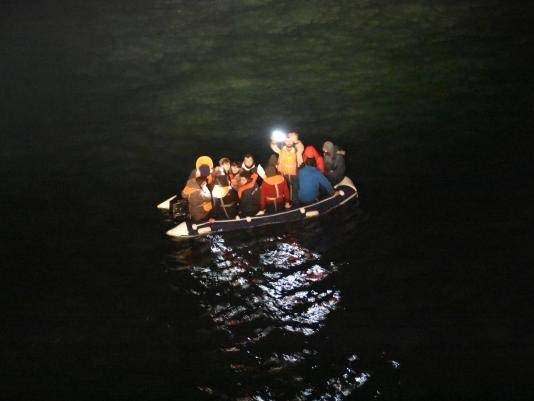Coronavirus: Nearly 100 migrants try to cross English Channel as UK lockdown intensifies

Five small boats carrying around 80 migrants on a desperate journey across the English Channel have been intercepted by the Kent coastguard, as the UK’s coronavirus lockdown entered its second day.
A further boat, reportedly in distress and carrying a dozen adults and two children, was also rescued by French authorities at around 4am after a helicopter search.
Believed to have been suffering mild hypothermia, those packed aboard the tiny vessel were taken to Bolougne-sur-Mer and handed over to border police, the PA news agency reported.
Passengers in the five other boats were taken to Dover, where they are expected to be monitored for coronavirus.
There are fears that coronavirus poses a high risk to the estimated 3,000 refugees and migrants living in northern France, many of whom are suffering with respiratory issues after sleeping rough throughout the winter months.
But Care4Calais founder Clare Moseley said she did not believe fear of the virus, or the possibility of monitoring or treatment, was a motivating factor for the crossings.
“People in Calais are always, and always will be, trying to cross to the UK, that’s why they’re here. It’s not because of the virus,” she told The Independent, positing the attempted crossing was likely due to better weather conditions.
Ms Moseley was not aware of any cases of Covid-19 within camps, and said campaigners had been advised it would likely take longer to hit refugee populations around Calais because most new arrivals travel there on foot.
“Our problem is going to be when it does arrive, it is going to be bad — not so much it arriving here quickly,” she said, adding refugees in Calais have no places to wash their hands, and no ability to self-isolate.
“You can imagine how frightening it is for them. Everything that people are being told to do, they can’t do. They can’t take any measures to protect themselves.
“Everybody in the world is frightened right now, but for these people it’s particularly scary [because] the methods that other people are putting in place, they don’t have any control over.”
Ms Moseley said she did not think those in Calais felt they would be safer from coronavirus in the UK than in France, adding that coronavirus lockdowns and travel restrictions appear to be slowing the arrival of new refugees to northern France.
She warned “refugees are being left out” of coronavirus protection efforts, describing this as “a problem for the whole of society”.
“The only way we’re going to beat [coronavirus] is if we protect society as a whole,” she said. ”If we leave some people out, then we’re not all protected are we?”
Campaigners have also warned the mass detention of migrants is a risk to public health, with a woman held at Yarl’s Wood having recently tested positive for Covid-19.
In an open letter, 10 organisations called for those held in immigration detention centres to be released as a result of coronavirus, and monitored using bail conditions and electronic tagging instead.
“Mass detention without adequate healthcare is a risk to public health, and detention is only lawful if there is a prospect of imminent removal,” said Bella Sankey, the director of Detention Action.
The shadow immigration minister, who backed this call, on Wednesday warned the government’s immigration policies may be discouraging migrants from seeking NHS assistance.
“The hostile environment remains a powerful barrier to people coming forwards for medical assistance,” said Bell Ribeiro-Addy, MP for Streatham.
“The government has stated that coronavirus testing and treatment will be free for migrants but has done nothing to publicise this fact.
“There are many reasons people from migrant communities might be reluctant to come forwards for treatment: fear that their status might be exposed, confusion over possible treatment costs, or even the knowledge that they could be charged if it transpires they require treatment for something other than Covid-19.
“Above all, what puts many off is the general mistrust and fear instilled by the Home Office over a number of years as they consciously tried to made life miserable for migrants.”
The Home Office confirmed the Border Force was “dealing with ongoing small boat incidents” and had not responded to Ms Ribeiro-Addy’s comments at the time of publication.
Read more
Stay or go? Tough choices facing migrants stranded by coronavirus
Thousands of migrants on French coast ‘at high-risk’ from coronavirus
Home Office urged to suspend ‘hostile environment’ during coronavirus
How to help the elderly and vulnerable during the coronavirus
How to feel less anxious about the coronavirus
How to be productive when working from home during coronavirus

